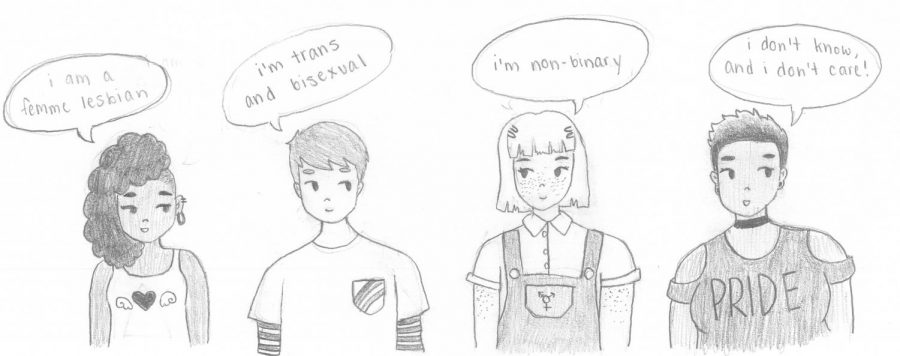Labels are Unnecesary
June 5, 2019
Teenagers feel a lot of pressure to label their sexuality in high school because, as they are nearing the end of puberty, they are expected to know who they are attracted to. This is the age when a person is supposed to discover who they are. Teens feel the need to sort their peers into those neat little boxes everyone keeps in their heads.
However, the pressure to qualify one’s sexual orientation can be detrimental to a person’s mental health when they are trying to figure out their sexuality. At this time, teens are still trying to understand how they want to express their gender identity.
A person’s sexuality can be fluid, especially for people who have identified as bisexual at some point in their lives. For people questioning their sexuality, it is sometimes hard to recognize romantic and sexual feelings for another person, or guarantee one will always be attracted to people of that gender.
Many people in the LGBTQ community have also felt pressure to stick to a label once they choose it in order to maintain the validity of their identity. This makes coming out a harder and more stressful process than it needs to be.
The heteronormativity of society also adds another layer of difficulty to the coming-out process of people in the LGBTQ community. Because people use labels and assume that a person is straight and cis-gendered –the gender a person is assigned at birth — in today’s world, anyone has who identifies as anything else is expected to announce it to the world.
One solution that is already in place for people who aren’t sure of their sexuality is to use the label, Q. Q in the LGBTQ community most often stands for queer — someone who doesn’t identify as straight or is not sure whether they are straight or not. Although this title has previously been used with a negative connotation, the label is now being reclaimed as something that is acceptable within the LGBTQ community.
Sometimes Q can also mean questioning, which is a way to allow a person to take their time choosing a label that fits them while leaving the door open for any possibilities. The only downside to this label is that it is not technically supposed to last for a person’s entire life. It is supposed to lead to the use of a different label. Still, claiming you are questioning your sexuality can allow for some freedom and possible experimentation, at least during high school and beyond.
While many people argue that labels allow for an easy way to avoid rejection because the majority of the population is heterosexual, this is not always the case. Knowing whether or not a person is attracted to people of your gender can be helpful when trying to pursue the person romantically. However, that doesn’t mean that person is guaranteed to be attracted to you. The same way it is possible for a straight person to not be romantically interested in a person of the opposite gender, it is possible for a gay person to have a platonic relationship with another person of the same gender.









 Watch the full video o
Watch the full video o







![Taylor Swift’s newest album titled Midnights 🌙 takes a deeper look at the persona of Taylor herself, and according to reporter Alina Miller, although this isn’t Taylor’s best work, there are highlights worth mentioning about. 💫
Click the link in the bio to check out the full article!
[Photo Caption: Taylor Swift hits all top 10 spots on Spotify’s Billboard Top 100 chart]
#taylorswift #midnights #tiktok #antihero #spotify](https://scontent-iad3-1.cdninstagram.com/v/t51.29350-15/314744727_1556543814822641_1643591421920256829_n.jpg?_nc_cat=110&ccb=1-7&_nc_sid=8ae9d6&_nc_ohc=aDxNzq2snTYAX_gAl0G&_nc_ht=scontent-iad3-1.cdninstagram.com&edm=ANo9K5cEAAAA&oh=00_AfBa4EluVzZT-7d5rKyT6tLJo0UJuCvRJPSCMX71aeO38Q&oe=63965890)



 Watch the full video
Watch the full video 
